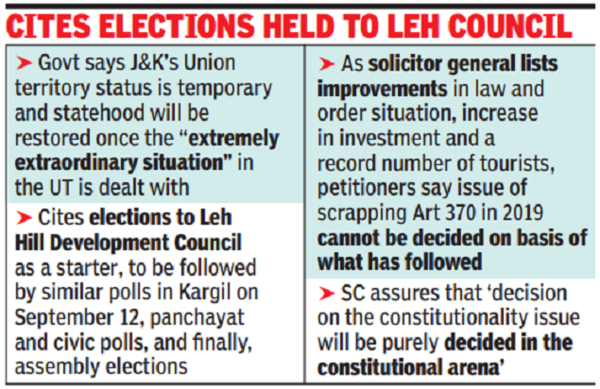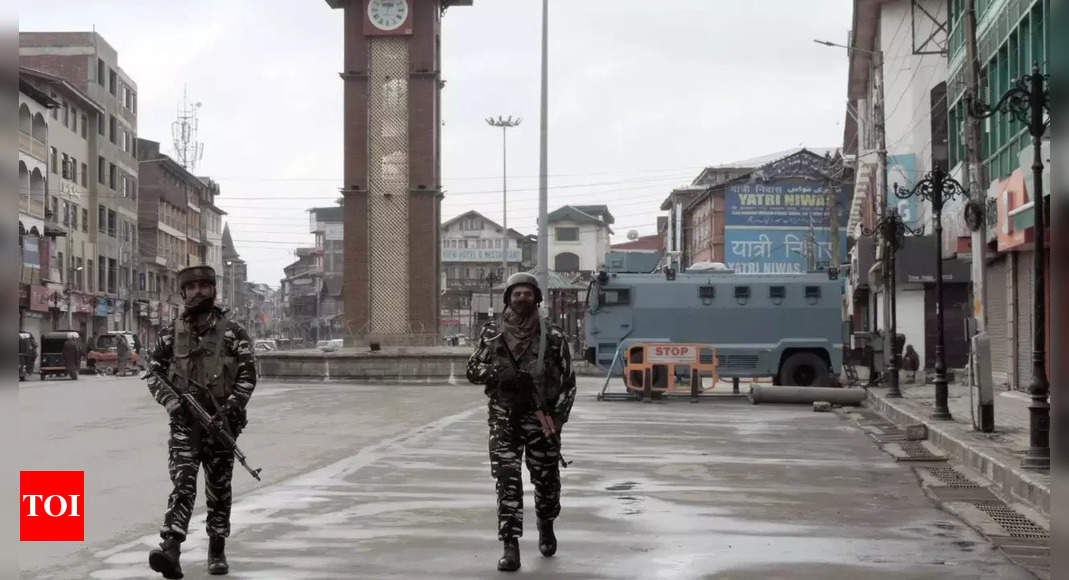NEW DELHI: The Union government told the Supreme Court on Thursday that assembly polls in the Union Territory of Jammu and Kashmir could be conducted as and when the Election Commission took a decision but expressed inability to set a definite timeframe for restoration of statehood to the UT.
Responding to the court’s query on Tuesday on the roadmap for restoration of statehood and conducting assembly elections, solicitor general Tushar Mehta said, “The Union government is ready for (conducting) elections at any time now. Till date, updating of voters list was going on, which is substantially over. Only some part of the work remains to be completed, which the EC is doing.
“It (holding of elections) will be a call taken by the UT and Union ECs together after assessing the ground situation and readiness of the UT administration for holding assembly elections.”

The SG further told a bench of CJI DY Chandrachud and Justices Sanjay Kishan Kaul, Sanjiv Khanna, BR Gavai and Surya Kant, “So far as statehood is concerned, the Union government’s firm stand is that J&K’s UT status is a temporary phenomenon. We are dealing with an extremely extraordinary situation. The UT will have to be infused with several things before being bestowed with statehood again. Those actions have already been initiated.”
He said elections to Leh Hill Development Council had been completed and those for Kargil were scheduled for September 12. After these, elections to panchayats would take place followed by polls for municipalities. Finally, assembly elections would take place based on the dates fixed by the ECs, he said.
Though the SC had asked about roadmaps on elections and statehood, the SG seized the opportunity to rattle off statistics about vastly improved law and order situation, reduced terrorist activities, substantial increase in investments and a record number of tourists visiting the state, much to the chagrin of counsel for petitioner political parties which have challenged the hollowing of Article 370 of the Constitution, scrapping of special status for J&K and its division into two UTs.
The SG said investment proposals of more than Rs 1 lakh crore had been received for the two UTs. As many as 32 of the 53 projects, under the PM development package worth Rs 58,770 crore, were completed. He said 1.8 crore tourists visited the UT last year and their number had already crossed 1 crore this year, giving a major boost to the traditional sector that employed a large number of people.
National Conference leader Mohd Akbar Lone’s counsel, senior advocate Kapil Sibal, said the court could not take these post-August 2019 developments into account as these had no bearing on the petitions challenging the constitutional validity of the decision to scrap special status of J&K and its bifurcation into the UTs of J&K and Ladakh.
Both the SG and attorney general R Venkataramani readily conceded that the government was not relying on the post-August 2019 development work and drastic improvement in the law and order situation as a ground to defend the constitutional validity of its move to strip Article 370 of its core clauses on August 5, 2019. Taking a swipe at Lone, the SG said, “Peace does not come merely by politics. It comes through welfare schemes and beneficial projects which have been introduced.”
The bench assured Sibal that the SG was only responding to the court’s query and that post-August 2019 developments would have no bearing on the scrutiny process for determining the decision’s validity. “We had asked them about the roadmap to hold elections. They have responded. But our decision on the constitutionality issue will be purely decided in the constitutional arena,” the CJI said.
Sibal said, “These proceedings are all televised and recorded. When these things go into the public domain, people think what a great thing the government has done. This creates a problem. If these assertions stay on the court’s record, that creates a problem. If the government puts 5,000 people under house arrest and imposes Section 144 of CrPC throughout the state, there can be no bandh or hartal. The court should not enter this arena, otherwise I have to counter these assertions with the huge problems faced by the youth in the state from drugs and unemployment.”
In feigned innocence, the SG asked Sibal, “When has progress and development created a problem?” In a lighter vein, he added, “If detaining 5,000 people resulted in no stone-pelting, bandh or hartal, it would mean that the right people were detained.”
Responding to the court’s query on Tuesday on the roadmap for restoration of statehood and conducting assembly elections, solicitor general Tushar Mehta said, “The Union government is ready for (conducting) elections at any time now. Till date, updating of voters list was going on, which is substantially over. Only some part of the work remains to be completed, which the EC is doing.
“It (holding of elections) will be a call taken by the UT and Union ECs together after assessing the ground situation and readiness of the UT administration for holding assembly elections.”

The SG further told a bench of CJI DY Chandrachud and Justices Sanjay Kishan Kaul, Sanjiv Khanna, BR Gavai and Surya Kant, “So far as statehood is concerned, the Union government’s firm stand is that J&K’s UT status is a temporary phenomenon. We are dealing with an extremely extraordinary situation. The UT will have to be infused with several things before being bestowed with statehood again. Those actions have already been initiated.”
He said elections to Leh Hill Development Council had been completed and those for Kargil were scheduled for September 12. After these, elections to panchayats would take place followed by polls for municipalities. Finally, assembly elections would take place based on the dates fixed by the ECs, he said.
Though the SC had asked about roadmaps on elections and statehood, the SG seized the opportunity to rattle off statistics about vastly improved law and order situation, reduced terrorist activities, substantial increase in investments and a record number of tourists visiting the state, much to the chagrin of counsel for petitioner political parties which have challenged the hollowing of Article 370 of the Constitution, scrapping of special status for J&K and its division into two UTs.
The SG said investment proposals of more than Rs 1 lakh crore had been received for the two UTs. As many as 32 of the 53 projects, under the PM development package worth Rs 58,770 crore, were completed. He said 1.8 crore tourists visited the UT last year and their number had already crossed 1 crore this year, giving a major boost to the traditional sector that employed a large number of people.
National Conference leader Mohd Akbar Lone’s counsel, senior advocate Kapil Sibal, said the court could not take these post-August 2019 developments into account as these had no bearing on the petitions challenging the constitutional validity of the decision to scrap special status of J&K and its bifurcation into the UTs of J&K and Ladakh.
Both the SG and attorney general R Venkataramani readily conceded that the government was not relying on the post-August 2019 development work and drastic improvement in the law and order situation as a ground to defend the constitutional validity of its move to strip Article 370 of its core clauses on August 5, 2019. Taking a swipe at Lone, the SG said, “Peace does not come merely by politics. It comes through welfare schemes and beneficial projects which have been introduced.”
The bench assured Sibal that the SG was only responding to the court’s query and that post-August 2019 developments would have no bearing on the scrutiny process for determining the decision’s validity. “We had asked them about the roadmap to hold elections. They have responded. But our decision on the constitutionality issue will be purely decided in the constitutional arena,” the CJI said.
Sibal said, “These proceedings are all televised and recorded. When these things go into the public domain, people think what a great thing the government has done. This creates a problem. If these assertions stay on the court’s record, that creates a problem. If the government puts 5,000 people under house arrest and imposes Section 144 of CrPC throughout the state, there can be no bandh or hartal. The court should not enter this arena, otherwise I have to counter these assertions with the huge problems faced by the youth in the state from drugs and unemployment.”
In feigned innocence, the SG asked Sibal, “When has progress and development created a problem?” In a lighter vein, he added, “If detaining 5,000 people resulted in no stone-pelting, bandh or hartal, it would mean that the right people were detained.”
Source link

